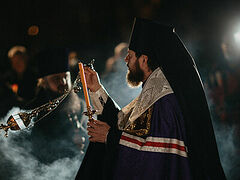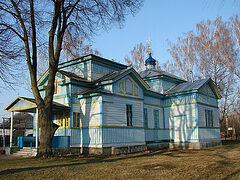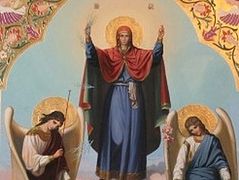“Thirty-five years have passed since the tragedy at the Chernobyl nuclear power plant. On that day, an explosion occurred in power unit no. 4. Two engineers were killed on the spot. Thousands of liquidators were exposed to a lethal dose of radiation... A high level of background radiation was recorded even in Western Georgia.”
Netgazeti. April 26, 2021
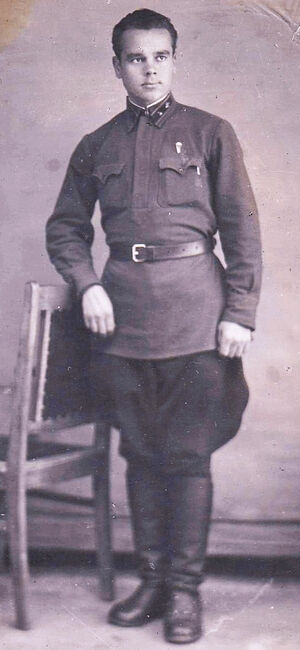 Ivan Feodosyevich Zhezherun. Graduation photo from the military department of the university, before the war Frankly, I started writing this article with inner trepidation. Perhaps there is not a single person who is indifferent to one of the most terrible man-made disasters in the history of mankind. I was affected by the Chernobyl disaster too: my grandmother contracted lymphosarcoma in 1986 and died, and my friend and I were caught in a rain brought by a radioactive cloud. My friend is still childless, and my husband and I waited for the birth of our son for sixteen long years.
Ivan Feodosyevich Zhezherun. Graduation photo from the military department of the university, before the war Frankly, I started writing this article with inner trepidation. Perhaps there is not a single person who is indifferent to one of the most terrible man-made disasters in the history of mankind. I was affected by the Chernobyl disaster too: my grandmother contracted lymphosarcoma in 1986 and died, and my friend and I were caught in a rain brought by a radioactive cloud. My friend is still childless, and my husband and I waited for the birth of our son for sixteen long years.
In a previous article I wrote about the head of the Zhezherun family, Feodosy Semyonovich.
And this article is dedicated to his middle son Ivan.
Ivan Feodosyevich Zhezherun was born on June 22 (July 5), 1915 in the Ukrainian village of Zhuravka of the Olshanka district of the Kiev province [now in the Cherkassy region.—Trans.] to a religious family. The children attended the Church of Great-Martyr Parasceva, built by their father, and were raised in the Orthodox faith. Ivan Feodosyevich later recalled how they sang prayers and blessed the food at home, and how on Palm Sunday they would run around the church “flogging” each other with pussy willow branches, according to the local tradition.
It was hard for their mother to raise six children alone, while their father, who fought in the First World War, was in Austrian captivity. But time passed, and he returned. They also survived collectivization.1 As I wrote before, the Lord, saved the family from being dispossessed. The children grew up.
In 1939, Ivan graduated from the Department of Physics and Mathematics of Dnepropetrovsk University. Then he studied in the graduate school of Kiev University, and worked at the Kharkov Institute of Physics and Technology (KIPT). His scientific adviser was Leipunsky,2 a student of Ioffe.3 Before the war, the school of nuclear physics of the KIPT was among the top schools in the country. Leiptunsky instilled in his student a love for nuclear physics, as well as for mountaineering. And together with the two professors they even conquered Elbrus.
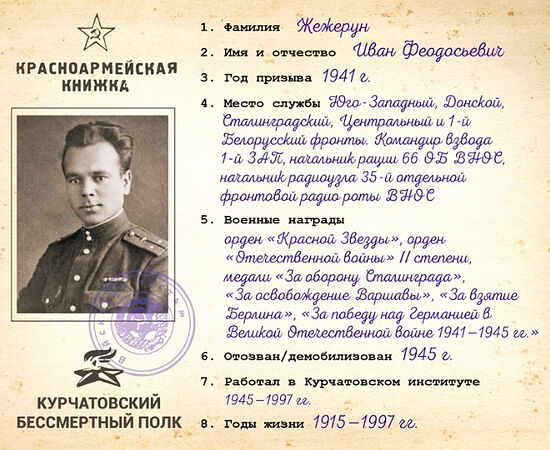 The Red Army card of Junior Lieutenant I. F. Zhezherun
The Red Army card of Junior Lieutenant I. F. Zhezherun
Despite his student status, with the outbreak of the Great Patriotic War (WWII, 1941–1945) Ivan Feodosyevich voluntarily went to the front with the rank of junior lieutenant, which he had recently received at the military department.
He was in command of a radio platoon, took part in the defense of Stalingrad, the liberation of Warsaw, and the Battle of Berlin. He was awarded the Order of the Red Star, twice, the Order of the Patriotic War II class, the medal “For the Defense of Stalingrad”, the medal “For the Liberation of Warsaw”, the medal “For the Capture of Berlin”, etc.
And even during the war he did not give up physics. In Berlin at his own expense he acquired a complete set of scientific physics journals to keep abreast of the latest achievements.
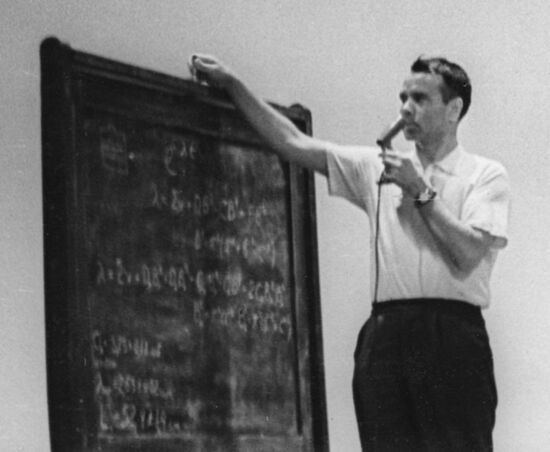 I.F. Zhezherun. 1966. Photo: http://www.biblioatom.ru/founders/zhezherun_ivan_feodosevich/
I.F. Zhezherun. 1966. Photo: http://www.biblioatom.ru/founders/zhezherun_ivan_feodosevich/
After demobilization, he began work in Moscow with Kurchatov.4
Ivan Feodosyevich was involved in the construction of the first atomic reactor in the Soviet Union and was the only participant in its launch who worked at the Kurchatov Institute right until his death—for fifty-one years. He was a laureate of the State Prize, awarded the Order of the Red Banner of Labor, the medal “For Labor Distinction of the USSR”, and so on.
But no matter what heights Ivan Feodosyevich reached—be it the conquest of Elbrus, scientific achievements or even the capture of Berlin, he remained a devoted son of God, serving above all Christ.
Nikolai Matveyevich Konopatkin (1914–1998), also a front-line soldier, was involved in the nuclear project. He believed in God, did not hide his faith—and for this he was sent to a mental hospital. When Ivan Feodosyevich heard about it, he began to intercede for his colleague and got him out of the hospital, although he himself risked a lot. When Ivan Feodosyevich died, Nikolai Matveyevich came to the funeral service and, running into the priest at the door, asked: “Where is the saint’s funeral being held here?”
After the death of I.V. Kurchatov, the new director of the Institute was Anatoly Petrovich Alexandrov (1903–1994), who had an absolutely different specialty and was not an expert at reactors. Nevertheless, he decided to create a closed “elite structure” under his own leadership, which was to deal with that problem. Ivan Feodosyevich was invited to join this structure, but at that time he was engaged in serious work, approved by the Ministry for the next five years. He offered his cooperation without an administrative transfer, but received a sharp reply: “You are either here or there...”
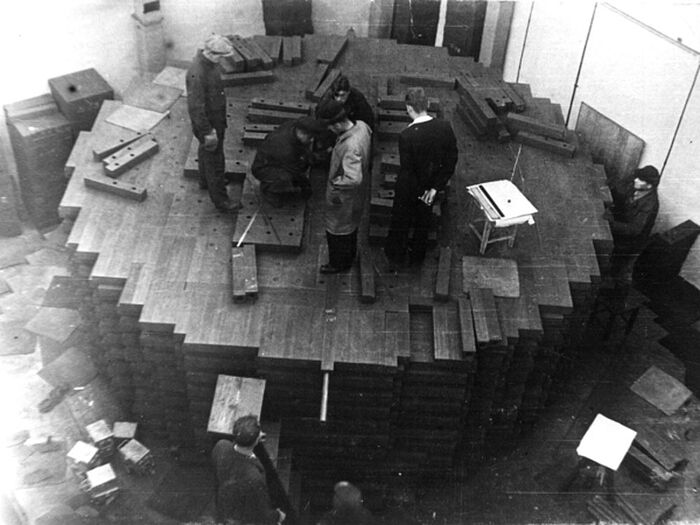 The graphite stack of the F-1 nuclear reactor. Photo: http://www.biblioatom.ru/founders/zhezherun_ivan_feodosevich/
The graphite stack of the F-1 nuclear reactor. Photo: http://www.biblioatom.ru/founders/zhezherun_ivan_feodosevich/
When the “elite structure” built its first production reactor in its own manner, by the will of God Ivan Feodosyevich became their opponent on those issues. He went to Leningrad, where the reactor had been assembled and prepared to start up. After examining the documentation, he issued a verdict: “The reactor must not be started up! It’s in danger of exploding!”
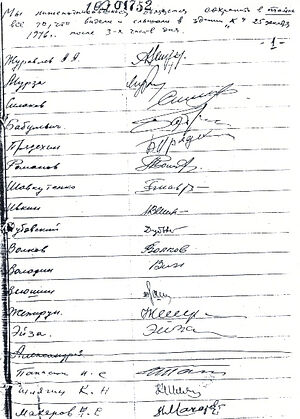 A copy of the signing of the non-disclosure agreement of those present at the start-up of the Soviet atomic reactor. Now declassified But it was launched regardless. The event was reported to the very top, and they received awards, prizes and ranks. It was decided to replicate the reactor throughout the country.
A copy of the signing of the non-disclosure agreement of those present at the start-up of the Soviet atomic reactor. Now declassified But it was launched regardless. The event was reported to the very top, and they received awards, prizes and ranks. It was decided to replicate the reactor throughout the country.
Then Ivan Feodosyevich, taking advantage of the opportunity to work with classified materials in the archive, began to thoroughly study everything related to the design of the first reactor. And he found out that two employees who had defended their dissertations in these works (from which many calculations had been taken), were unable to obtain the necessary data and so they simply fudged those calculations.
Ivan Feodosyevich began to sound the alarm, writing memoranda to Alexandrov, the Ministry, and the Central Committee. He was given the reply that he had himself withdrawn from that work, and now out of envy he was trying to cast doubt upon the creators of the reactor and the Institute administration.
But Ivan Feodosyevich did not give up. He was a genuine scientist for whom scientific conscientiousness and service to the truth were above all else. He began to think about how to improve the situation. He eventually developed a program for the reactor’s modernization: The implementation of this program would give the reactor sufficient stability; that is, it would cease to be explosive. Alexandrov rejected the program. Then the scientist turned to the Ministry. Minister Slavsky5 personally approved the program, entrusting its implementation to I.F. Zhezherun and his subdivision. Instructions were given to the Institute administration to assist in every possible way in the program’s implementation.
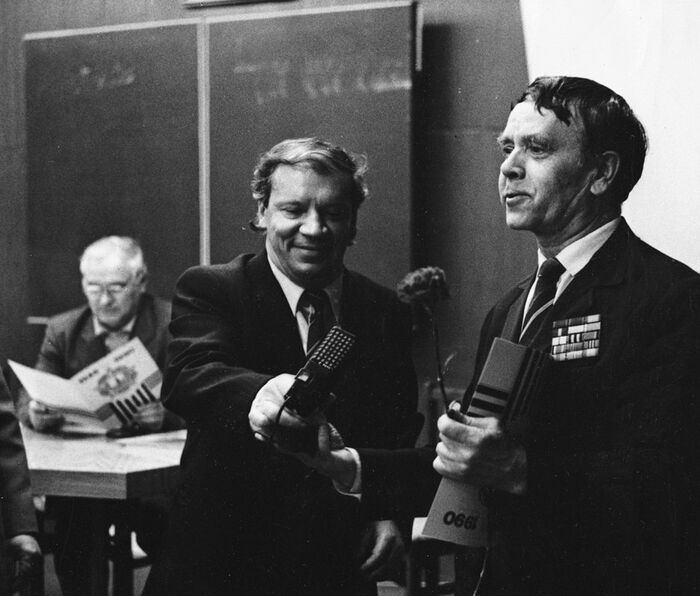 I.F. Zhezherun. May 9, 1990. Photo: http://www.biblioatom.ru/founders/zhezherun_ivan_feodosevich/
I.F. Zhezherun. May 9, 1990. Photo: http://www.biblioatom.ru/founders/zhezherun_ivan_feodosevich/
But then its implementation was made practically impossible—employees were taken away from him, he was not given “reactor time”, the necessary equipment was not provided, and several times he was even fired for the most absurd reasons, though the court reinstated him in his former job each time.
Hatred for the scientist reached such a height that in all official publications and broadcasts the names of Ivan Feodosyevich and those who supported him were excluded from the lists of those involved in the construction and launch of the first reactor. They tried to consign their names to oblivion.
The Lord’s words were fulfilled in him: Blessed are they which are persecuted for righteousness' sake: for theirs is the Kingdom of Heaven (Mt. 5:10).
But everything eventually comes to an end. And the retribution was terrible. After the explosion at the Chernobyl nuclear power plant, the Literaturnaya Gazeta newspaper published an article by S. Ushakov about the warnings of I.F. Zhezherun, and only then was he given the opportunity to deal with this problem.
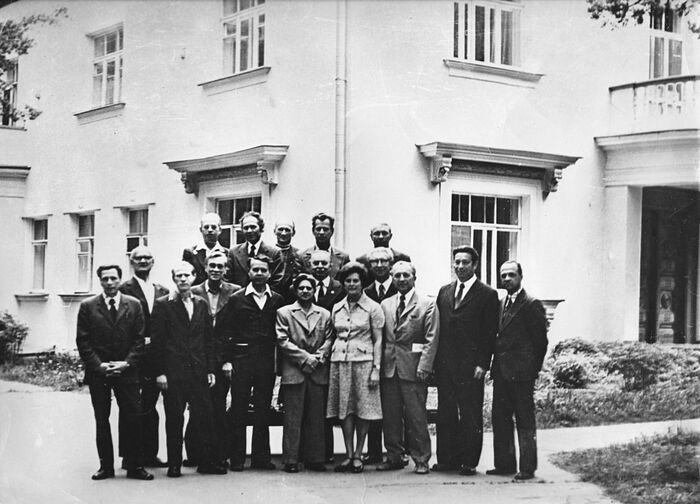 I.F. Zhezherun among colleagues. Photo: http://www.biblioatom.ru/founders/zhezherun_ivan_feodosevich/
I.F. Zhezherun among colleagues. Photo: http://www.biblioatom.ru/founders/zhezherun_ivan_feodosevich/
In 1997, Ivan Feodosyevich Zhezherun died of cancer. According to his daughter, Irina Ivanovna Zhezherun, “It was another well-deserved ‘award’ for fifty years’ work on the creation of Russia’s nuclear shield.”
In the last year of his life he wrote a book based on archival materials, which he entitled, How We Arrived At Chernobyl.
When he learned that he had a maximum of two to three weeks to live, he showed absolute humility before the will of God. He said: “I realize that everything will be as He pleases.”
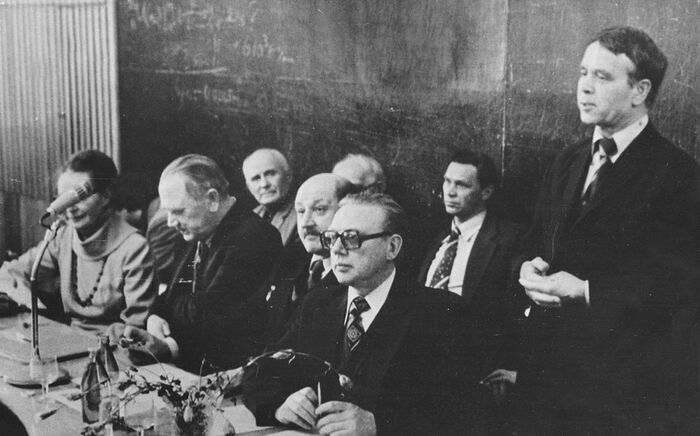 I.F. Zhezherun. May 9, 1990. Photo: http://www.biblioatom.ru/founders/zhezherun_ivan_feodosevich/
I.F. Zhezherun. May 9, 1990. Photo: http://www.biblioatom.ru/founders/zhezherun_ivan_feodosevich/
The only thing that worried him was that he did not have time to finish the book. But even a terminal illness could not make him stop working. Lying in bed, he worked and prayed all day long, asking God to give him more time to finish the work of his whole life. And the Lord answered his prayers: Ivan Feodosyevich lived for almost seven more months, enduring unbearable pain with amazing courage. He refused painkillers as he needed a clear mind to work.
The book was finished! The next night he began to feel bad. Ivan Feodosyevich was exhausted by illness and hunger, because all the previous week he could eat only a small piece of prosphora and drink some Theophany water once in the day. The scientist's daughter related:
“Ten days before his birthday, in the evening, I went into his room and was startled. Father—a man who was not afraid of anything, who remembered all the horrors of the post-revolutionary period and who had gone through the war—was in terrible confusion.
“My husband and son went to the Danilov Monastery (Moscow) and brought Igumen Joasaph from there. He heard my father’s confession, and gave him Holy Communion and Unction. After that my father immediately calmed down and was all there, in communion with an invisible realm. Not more than half an hour later he fell asleep in the Lord. And after that there was such silence and peace of mind beside him that I remembered the words of my son, the choir-director of our church: ‘It was as if the Lord had come and taken his soul in His arms.’
“When we were preparing to wash his body, we saw that the whole bed was covered with some strange shreds. We didn’t understand what had happened until we saw that there was no diaper on him—and it couldn’t be found anywhere.
“It was then that I understood my father’s words, which he had uttered in a confused state and the meaning of which had escaped me: ‘They (demons) have taken my diaper.’
“Not only did they take it away, mocking the weak, dying old man, but also tore it into shreds, trying to plunge his soul into fear in order to take possession of it. Fear is a manifestation of weak faith, or even rejection of faith, and God forbid that death finds one’s soul in such a state.”
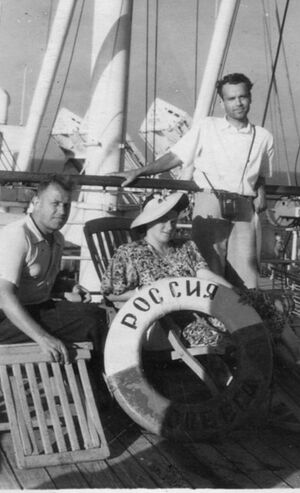 I.F. Zhezherun with his family. Photo: http://www.biblioatom.ru/founders/zhezherun_ivan_feodosevich/ But the Lord was as always stronger, and He sent His faithful servant a peaceful death.
I.F. Zhezherun with his family. Photo: http://www.biblioatom.ru/founders/zhezherun_ivan_feodosevich/ But the Lord was as always stronger, and He sent His faithful servant a peaceful death.
Before his repose, Ivan Feodosyevich asked his daughter not to give the manuscript to the Institute (only a copy), since some “heroes” of those events were still alive and wanted the manuscript to disappear.
Unfortunately, the book, How We Arrived At Chernobyl—the work of Ivan Feodosyevich Zhezherun’s life—was never published. The manuscript is in rough draft, with many formulas, without which the text would be incoherent. All of Ivan Feodosyevich’s colleagues who were capable of helping have already departed to the Lord. We need an intelligent nuclear physicist who would edit the manuscript and prepare it for publication; and funds for its publication are needed. The scientist’s daughter asks for help in the hope that the work of her father's life would not be not in vain, and that the manuscript would finally be published. Not only she needs it—we all need it. A tragedy like Chernobyl should never happen again!

